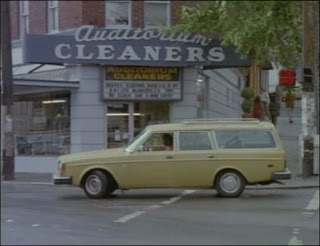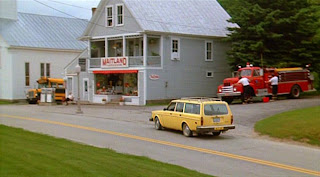The other night rather late and admittedly a little bit drunk I slumped down on the sofa and jabbed the remote at the TV. On came The Hand That Rocks The Cradle, not, unfortunately, a documentary about The Smiths but the kitsch horror film starring Rebecca De Mornay as a homicidal nanny.
The Hand That Rocks The Cradle was one of a number of late '80's/early '90's Hollywood movies that employed a similar narrative trope in which the domestic space of the family home becomes threatened by an initially friendly intruder. In this particular case, the film plays on the threat to the stable nuclear family posed by a single, childless woman. The dubiousness of this as a storyline needn't detain us here, but what is more interesting is the way in which the accouterments of stable family life are deployed as props. One of these is the family car, which in this case is the venerable Volvo 240.
The Volvo 240 serves (or at least served) a number of purposes within the semiotic field inhabited by Hollywood script writers and art directors. Firstly there is the question of its impressive, almost indestructible, solidity. Someone who drives a Volvo clearly puts the lives of their passengers before concerns about style, handling or speed. In a pre-SUV era, the 240 was as big and tank-like as cars got. It was the ultimate family vehicle: roomy, great for camping trips and packed with useful safety features.
There is also the question of its Europeaness or, more specifically, its Swedishness. This is important in an American film and a country so sentimental about its car industry. In this context driving a European car could be seen as verging on the unpatriotic. The car's symbolic value has to carry an awful lot of weight in other areas then in order to counter any suggestion of un-American behaviour.
Semiotically it acts as a symbol of civilised family life, a signifier of stability and bourgeois responsibility. This is an Americanised version of Social Democracy, where the collective obligations of community life have been shrunk to the size of the nuclear family. This basic social unit is potentially always under threat from discarded lovers (Fatal Attraction), predatory single women (or men in the case of Indecent Proposal) or other un-domesticated individuals unencumbered by responsibility or duty. In this context, American cars, so clearly bound up with a mythology of freedom and the open road, lack the essential social stability of the Volvo.
Another almost identically coloured Volvo 240 appears in Tim Burton's Beetlejuice a film that came out a couple of years before The Hand That Rocks The Cradle. Beetlejuice is a vastly superior film to of course and nothing like as tediously conservative in its morality, but the Volvo plays a similar role in it. The couple who die at the beginning of the film do so in a car crash, their car plunging over a bridge and into a river below. This plot twist allows them to return to haunt their own home after some uptight and unlovely aesthetes from New York move in. The couple's down-to-earth values are contrasted with the gauche pretensions of the new owners at every turn, a scenario in which architecture plays a significant role too, as you can see here.
Despite driving a family car, the couple in Beetlejuice are childless. Significantly though they devote much of their time to constructing an accurate scale model of the small town in which they live. There is a suggestion in this that they are caretakers - or perhaps even parents - to the town, guardians of its values. They also become surrogate parents to the a disaffected teenager played by Winona Ryder. The volvo 240 is a symbol of their suitability as parents as well as their honest, pragmatic values.
The ultimate 'enemy at the door' film is of course Fatal Attraction. As well as exhibiting similarly unpleasant misogynistic tendencies to The Hand That Rocks The Cradle, Fatal Attraction has another obscurer connection. Columbo-like, I checked it out on the invaluable Internet Car and Movie Database and there it was: family man Michael Douglas drives a Volvo. Ok, it's not a 240 (a 360 actually, as Sammy J pointed out to me - thanks) but, still, it's enough to convince me there's a case.
The ultimate 'enemy at the door' film is of course Fatal Attraction. As well as exhibiting similarly unpleasant misogynistic tendencies to The Hand That Rocks The Cradle, Fatal Attraction has another obscurer connection. Columbo-like, I checked it out on the invaluable Internet Car and Movie Database and there it was: family man Michael Douglas drives a Volvo. Ok, it's not a 240 (a 360 actually, as Sammy J pointed out to me - thanks) but, still, it's enough to convince me there's a case.





8 comments:
I hate to be picky Charles, but I think that the Volvo in Fatal Attraction is a 264. I am, dare I say it, a bit of a Volvo fan. But I can't imagine hipsters giving up their fixed gear bikes to drive them any time soon...
Interesting! I never knew there could be so much to a Volvo (the car of my - yes very Swedish - childhood).
Also thanks for introducing the Internet Car and Movie Database. Fantastic.
a drink (or two) can make wonders on (cof, cof) architectural criticism (smile)
the (white) house on the hill on Beetlejuice is the nec plus ultra representation (on film) of po-mo architecture
(hope this will make sense)
http://odesproposito.blogspot.com/2011/12/in-case-of-emergency-draw-door.html
It IS superb isn't it? Early Graves meets Sottsass. I think it's a definite improvement on the original house and Oto is a much maligned designer.....
And then on the other side of the water, there's "Lovejoy."
I heard on Swedish public radio a couple of years ago about Saab's in movies, in conclusion that they are/were usually driven by mentally unstable people. Unfortunately I don't remember more in details about it.
/ David L.
it is even a line in "the rock" in which the quiet main character describes/defends himself with the words:
"Look, I'm just a biochemist. Most of the time, I work in a little glass jar and lead a very uneventful life. I drive a Volvo, a beige one."
it is even the right colour :)
Post a Comment